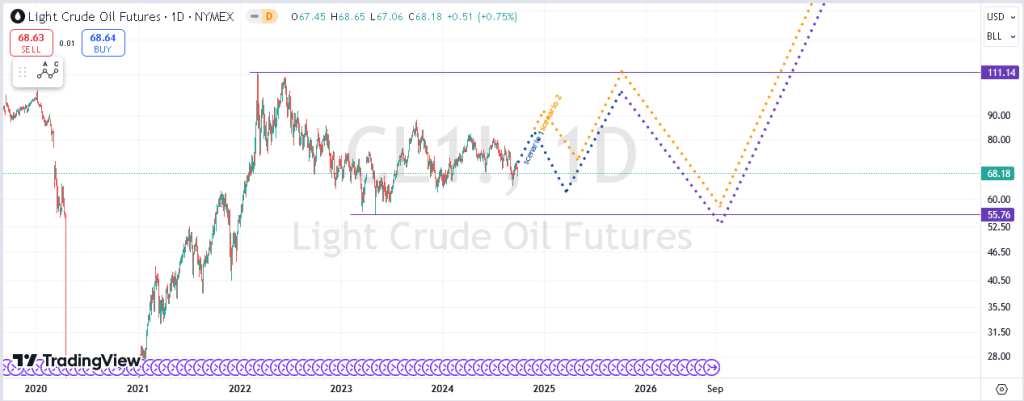A financial crash doesn’t happen for no reason. Financial crashes and meltdowns aren’t sparks in a void that dies almost without notice. There has to be a preceding event. Even if there is no apparent reason, there is always a cause!

This article continues Timing the Next Financial Crash in 2024—part 1.
It provides some context, including the potential cause and future market impact.
I’ve mentioned when the next financial crash will occur with little information. What is the context, the cause, and the potential impact of the coming financial crash?
I will discuss what triggers this event, its reasons, and its broader context as a small piece of the world’s puzzle.
Given the magnitude of the crisis unfolding, the small puzzle is a derisory and a trivial term.
The crash will likely occur just after the first week of October – between the 7th and 9th of October 2024, but things are rapidly developing and confirming further aggravating developments.
Cause Of Financial Crash Of October 2024
The leading cause is a massive, never-seen attack on Israeli soil or a conventional war involving Israel.
Israel, since its birth as a state, has had multiple wars and these days engaged once again in attacks in Lebanon.
The likelihood of re-entering Lebanon is high. It would be the fourth clash, as it happened in 1978, 1982, and 2006.
This new war will threaten the Middle East’s stability.
The public perception is critical and could also spark further complications.
Context of the financial crash
These attacks are not necessarily reprobable, but their means are.
The general public, the ONU, and other forms of government and civil rights see only half of the glass: the human collateral casualties.
This action is a big deal because even though Lebanon hides Hezbollah’s proxy paws from Iran, from the outside, it looks like an ethnic epuration.
It’s also Israel’s dilemma because, as a YouTuber pointed out, even Israel’s life depends on inflicting wars and gaining additional territories in both Palestine and northern Israel, even to hope to resist a massive war. Otherwise, it could fall very quickly.
Brief history of Israel

Theodor Herzl proposed creating the Israel state in his book in 1896 – Der Judenstaat (“The Israel Estate” in English). But the state hadn’t materialized despite growing fears of antisemitism in Europe before even Nazis came to power in Germany in January 1933.
Since its creation, with the “aid” of the ex-empire – Britain, more precisely with the help of its British Foreign Secretary – Arthur Balfour, had much animosity and for good reason.
Israel would occupy 55% of the land of Palestine while the Arab state got only 45%, even though the arab population was a majority back then.
So, the resolution passed with three times more agreeable votes than against.
Although the resolution passed, 13 countries voted against, three of them are neighbors of Israel: Egypt, Lebanon, and Siria.
The other countries that voted against it are Afghanistan, India, Iraq, Pakistan, Saudi Arabia, Yemen, Turkey, Cuba, Greece and Iran.
Israel and its geopolitics
After the brutal attacks from Palestine inside Israel on the morning of October 7, 2023, there were several “attacks” at the United Nations Human Rights Council.
Israel was accused of war crimes in Palestine as a counter-response to initial attacks by several more countries: Jordan, Indonesia, Malaysia, Algeria, Morocco, Russia, the People’s Republic of China, South Africa, and Venezuela, but also, surprisingly, Sweden, Ireland, and Spain.
The rest of them are the ones who voted against forming Israel as a state, excluding India and Afghanistan.
The list of supporting countries is alarming. The countries mentioned above might support Iran’s actions.
For example, if Egypt delivered low-grade respiratory masks to Iran, Israel would have to reconsider the implications of this emerging new pattern and retest the so-called friendship or alliance.
The world’s deep division could split in half.
Also, countries that have increased their adhesion to BRICS are alarming.
BRICS is a cooperation mechanism developed in 2009 by the following countries: China, Russia, India, Brazil, and South Africa. Its main goal is to increase its member’s power in the global economic arena just after the financial crisis.
Since its formation, the list of countries has increased from 5 to 11 and threatens to grow to 21 members. Countries like India, Algeria, Turkey, Mexico, Bangladesh, Nigeria, Senegal, Thailand, Pakistan, and Venezuela might expand the list.
Therefore, at least a large number of countries choose their side.
On one side, Western countries are part of the NATO alliance, UE, and other forms of cooperation.
On the one hand, Western countries are part of the NATO alliance, the EU, and other forms of collaboration, and on the other hand, emerging countries want to join the few countries that question the power of the United States.
This division level is comparable to that seen in World War 2. This war can potentially weaken the fragile global economy in many ways.
When will the war escalate?
I anticipate the attacks to escalate further, potentially complicating near October 2, 2024.
Potential effects of the financial crash of 2024
One of the multiple effects of the financial crash will be felt on crude oil
The Crude Oil will spike very much. But energy inflation will not happen immediately. It will probably take weeks before it does, causing severe damage to companies highly dependent on its price.
Now, depending on the gravity of the war, if there were a declaration of war, it would change pale compared to the other attacks.
As the media pointed out, the attack should have occurred in late August 2024, but it didn’t.
So, the crude oil price fell from 10 dollars a barrel, more or less.
Crude Oil recently rebounded slightly after a counterattack by Hezbollah.
Israel attacked Lebanon on 17-18 September 2024, using pagers and walkie-talkies, causing 42 deaths and over three thousand injuries.
However, this October attack is significant; it is not a counterattack, an isolated one (it is not a ping-pong attack like those after the October 8, 2023 attack). It will be the deadliest attack and push the price of Crude Oil to the 90-92 level bound.
According to my analysis, if and only if it crosses either the 111.04 or below the 55.76 levels, it becomes highly susceptible to 150-200 or even higher in weeks or even days.

Will it be the start of World War Three?
It depends on how the other players respond after the attack. This dynamic also dictates the caliber of guns used.
On the morning of October 8, 2023, attacks in Israel, both homemade missiles were developed by Hamas members.
Still, also several drones and long-range missiles used in the attack had Iran origins.
However, precise weapons are essential in a conventional war. These can include precision-guided missiles and other sophisticated and diverse means of war.
Depending on the type of war, these means can consist mainly of heavy weapons, mortars, grenade launchers, machine guns, and riffles.
It is yet to be determined if Iran has vast supplies of these weapons. But it probably has riffles and mid and long-range weapons. Also, it is unclear if Iran has developed its nuclear capabilities. An atomic threat will change the type of war, if any.
Israel tried for years to erase any race for nuclear developments in Iran. It bombed covertly military bases inside Iran and sabotaged any attempts in this direction.
However, if things become further complicated and, let’s say, Israel invades Lebanon, maybe the country will be faced with strong opposition from arab countries. In this way, the invasion itself would be the ultimate spark of World War 3.
Allies in a hypothetic war
Also, in terms of allies, voting against Israel’s interests is vital and directly impacts the magnitude of the war.
For instance, there are some divisions in the Middle East, too: Iran has a close alliance with Siria and Iraq.
Saudi Arabia, Yemen, and UAE have Israel’s back, making a common front against Iran. Still, some undecided “wild card” countries like Kuwait, Jordan, Kuwait, Qatar, Egypt, and Turkey exist.
However, Turkey and Egypt are the most important ones that could play more decisive roles.
These informal alliances depend on the fact that there will be much outside help if US warships move into the Mediterranean, Red Sea, or the Persian Gulf, which interfere more dynamically and stir things up even more.
But the main thing is how the war will start if there is a perception of misconduct of Israel regarding Lebanon now in the middle of an election year in the United States of America.
In this case, US leaders, at least the democratic ones, will have a dilemma supporting this war. And other countries from the West will have the same dilemma, too.
You might also like: Timing The Next Financial Crisis of 2024 – part one

Disclaimer
There is no World War 3 involving Israel and its neighbors; the article above doesn’t conclude that.
Also, the effects would develop only during a massive war. This article represents some developments based on the hypothesis of war.
News sources
- The Middle East’s New Battle Lines – ECFR
- Israel–Hezbollah conflict (2023–present) – Wikipedia
- Israel attacks Lebanon updates: Beirut suffers ‘unprecedented’ bombardment – Al Jazeera
- Explosives expert shows damage of pager bomb – CNN
- Der Judenstaat (book) – Wikipedia

